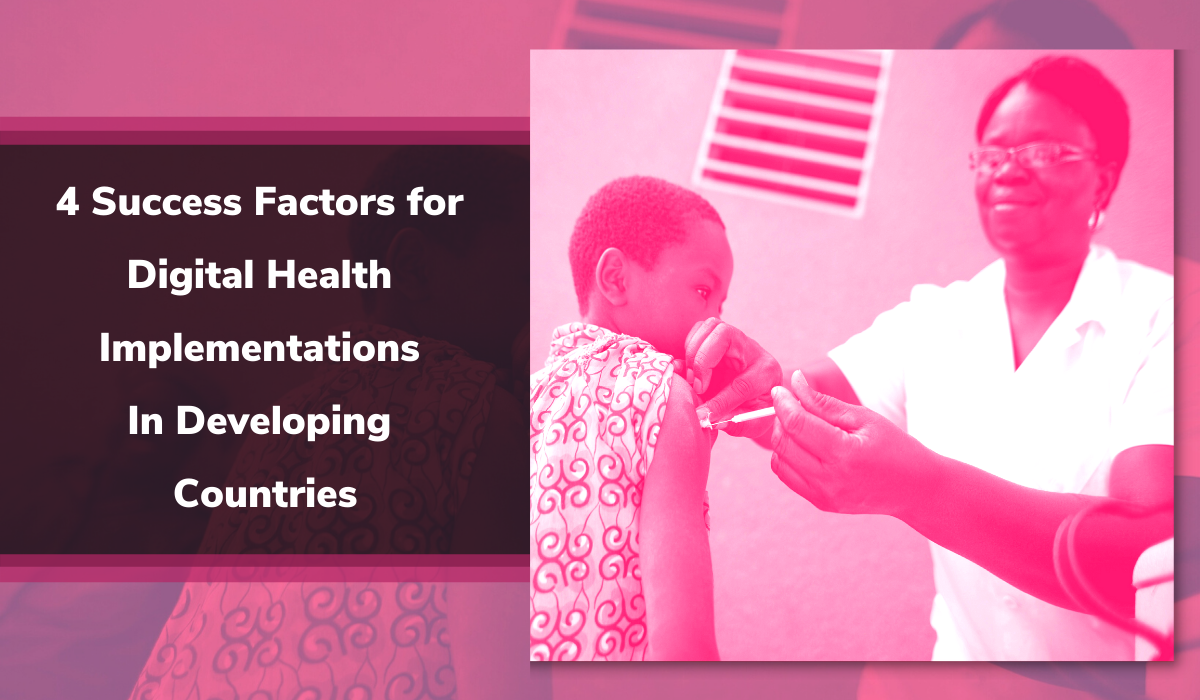Four Success Factors for Digital Health Implementations In Developing Countries by Subhabrata Dasgupta on March 28, 2022 2,962 views

Inadequate access to healthcare, rural versus urban settings and low health awareness are major challenges faced by Low and Middle-Income Communities in developing countries (LMICs). A major reason behind this challenge is the presence of gaps in the healthcare system. These gaps coupled with the lower health awareness, break the continuum of care and deteriorate care quality.
The COVID-19 pandemic has only worsened these gaps and exposed them. Pre-pandemic, almost one-third of the population in these countries lived more than two hours away from access to essential healthcare services. Moreover, the ratio of healthcare workers to population was well below WHO-recommended standards. The pandemic and associated lockdowns disrupted transport systems further in LMICs. This disruption exacerbated the healthcare system gaps. Further, the loss of healthcare workers to COVID-19 made the situation worse.
One saving grace is the pandemic induced acceleration of digital adoption in healthcare, among other sectors starting with Telemedicine (touchless consults). Digital technologies can improve disease preparedness, care delivery and management in LMICs. In addition, they can strengthen primary healthcare, public health, plug gaps, ensure a continuum of care, and improve access.
At Argusoft, we work as solution designers, leveraging in-house, low-code frameworks in public healthcare. Supported with a grant from the Bill & Melinda Gates Foundation, we have pioneered remote care delivery and management in the public health area with our MEDplat framework.
MEDplat is a point-of-care application that provides an interface for healthcare providers through a mobile app and a web interface. This framework completely digitizes care delivery and management across all stakeholders.
Based on our experience in Digitizing Healthcare in Public Health settings, we have identified four key success factors for Digital Health implementations in LMICs. In this blog, we will attempt to elaborate on those four factors:
1. The synergy between government and digital-solution providers to drive scale
Solution designers have a key role in environments where governments and non-governmental organizations cannot build and deploy solutions independently. But, they cannot play this role without strong partnerships with governments. Top-level government support is an enabler. In addition, long-term engagements and partnerships with governments help solution developers achieve scale.
An example that illustrates this is TeCHO+, a comprehensive Public Health Solution that addresses vital multi-dimensional challenges of providing citizens in rural settings with on-time, high-quality, proactive healthcare. The success and scale of TeCHO+ is a testament to the long-running partnership between the State of Gujarat and Argusoft.
Over 13,000+ mobile workers use the TeCHO+ mobile application to serve a beneficiary base of over 65 million people.
2. Technologies with rapid customization abilities
Scale, timeliness and impact are of paramount importance in public healthcare. In suitable cases, stable and reliable technologies that allow for rapid customization can have a greater impact than developing brand new solutions from scratch. This is especially true in the public healthcare paradigm, where quick implementations have the potential to save lives. In addition, stakeholders in government and healthcare ecosystems also prefer already-proven solutions that are already a success and can be rapidly customized to meet unique needs.
Argusoft’s MEDplat is a comprehensive, low-code Public Health Management framework that can then be customized to create the required low code solution.
MEDplat is highly customizable and amenable to the diverse needs of different public and primary healthcare implementations. MEDplat’s interoperability with centralized government health-related portals is an added advantage. Since its genesis, MEDplat has evolved in terms of its scale, usage and acceptance in the field. It has been successfully implemented in different avatars for different healthcare contexts.
3. Human-centered design & operability in LMICs for a clear value proposition
When it comes to designing digital tools for the public healthcare sector in LMICs, the key considerations are the presence of an adequate environment (connectivity infrastructure, etc.) and the digital skills of the user base.
The need of the hour is to pursue human-centered approaches to design in alignment with user priorities, problems and the existing infrastructure in LMICs.
MEDplat is supported by proof of concept and execution, thanks to its many implementations in similar environments. In our experience, this has worked as a sort of ‘social proof’ for various stakeholders in government and associated decision-making bodies. In addition, our user-centered design and experience in similar contexts build a clear value proposition for stakeholders.
4. Interoperability for better coverage
The current primary digital healthcare landscapes of most LMICs are held back by fragmented solutions. Therefore, there is a need for independent digital solutions to connect to each other and the broader national healthcare ecosystem.
LMICs need to focus on building interoperability among multiple healthcare journeys. Whether at the regional level or the level of a nationwide healthcare ecosystem, interoperability is crucial.
This will enable a faster flow of data, collaboration between personnel, keeping all stakeholders up to date with analytics and reporting. The tangible outcomes of building interoperability are a broadened reach of healthcare delivery, a better quality of services and improved care coordination due to data sharing and seamless user experience. Over time, owing to easy access to data and analytics, the quality of professionals will also improve riding on the coattails of evidence-based guidelines.
Your Digital Transformation Enabler
At Argusoft, we have built and continue to build digital solutions that help bridge gaps in primary healthcare in LMICs. We work as trusted partners for governments and related bodies to achieve their healthcare goals with tailor-made solutions for these contexts. We also work with organizations like WHO, UN and related agencies on several healthcare initiatives that have resulted in successful implementations worldwide.
Come talk to Argusoft to accelerate your digital health transformation!